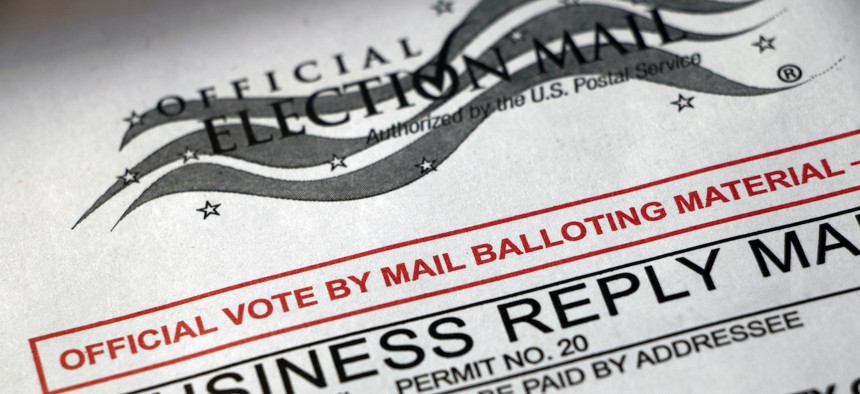
The Postal Service’s inspector general has previously recommended the agency create tracking requirements for election mail. Darylann Elmi/Getty Images
House Panel Advances Bill to Force Tracking on Ballots Mailed Through USPS
While Republicans have reservations about voting by mail, the bill won overwhelming bipartisan support.
A House committee on Thursday easily advanced a bill to allow municipalities and voters to track their mailed-in ballots, winning bipartisan support to bring more transparency to modern elections.
The Vote by Mail Tracking Act (H.R. 1307) would require any ballot sent to voters in a federal election to have a barcode on the envelope that allows the U.S. Postal Service to track each ballot. It would allow USPS to create envelope design standards with which municipal election offices must comply.
In recent elections, USPS has “strongly recommended” that state and local governments use its barcodes and the official election logo on ballots, but there was no requirement to do so. Postal management has ramped up its efforts to coordinate with election offices, establishing teams to focus on election efforts year round and working with local officials to establish relationships and set expectations. The Postal Service’s inspector general has previously recommended the agency create tracking requirements for election mail.
At a markup for the bill before the House Oversight and Reform Committee, lawmakers noted the rate of Americans voting through the mail has grown significantly in the last few decades and reached 46% of votes cast in 2020.
“Given the increase in the use of mail in ballots in recent years, it's important to ensure election officials and voters can track ballots once they're in the custody of the Postal Service,” said Rep. Carolyn Maloney, D-N.Y., who chairs the committee and introduced the bill.
To ease concerns of Republican members, who have consistently voiced reservations about the growth of voting by mail, Maloney stressed the bill included no requirement for states to offer more options absentee voting. Instead, the measure would create requirements for whatever choices states opt to include. The bill, which was ultimately approved 34-5, only won bipartisan support after Democrats agreed to drop a provision that would have reimbursed states for any costs they assumed to bring their ballots in compliance.
“I like that,” Rep. James Comer, R-Ky., the top Republican on the committee and a cosponsor of the major postal reform legislation that President Biden signed into law earlier this year, said of the bill’s intent, seeming to surprise himself. “I actually like this bill.”
The few Republicans who opposed the measure said it would “federalize” elections that are better left to states to administer.
Better ballot tracking would give voters better peace of mind, lawmakers said, as they could determine where in the mail stream their votes were at any moment. It would also ease the process for USPS, which every election cycle implements “extraordinary measures” to ensure every ballot is delivered to election offices by their deadlines. With greater visibility into where ballots are, postal employees would have an easier time identifying pieces of mail to pull out of the normal system to prioritize for delivery.
The measure will now head to the House floor for a vote, though lawmakers would have to start over if they cannot pass it through that chamber and the Senate by the end of the year.







